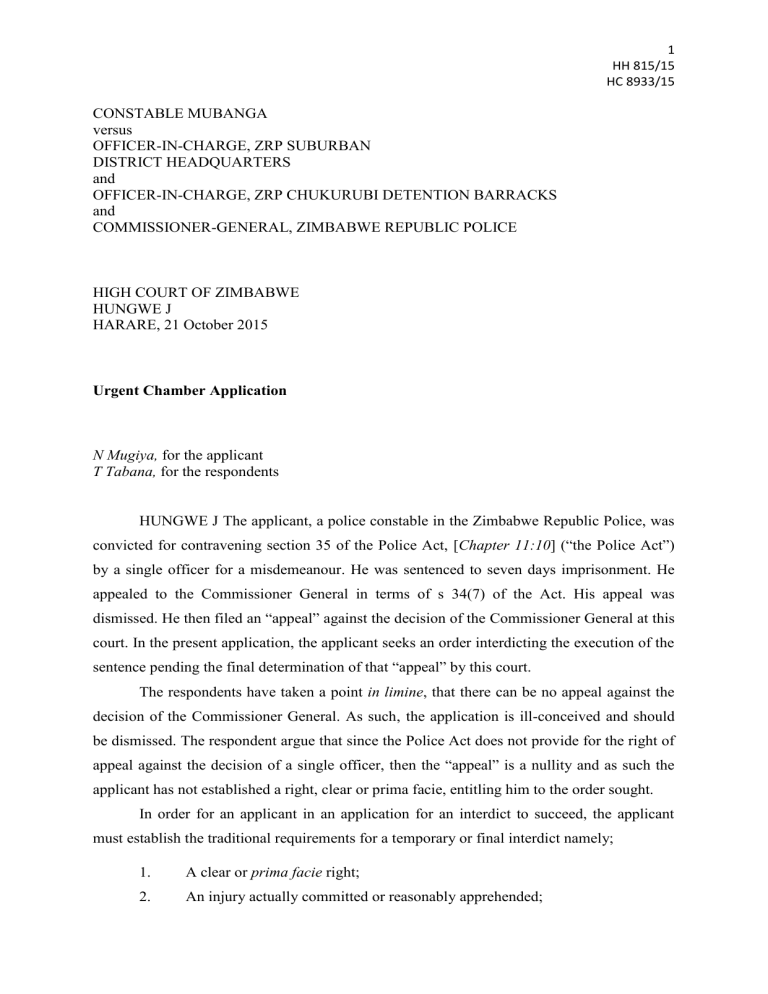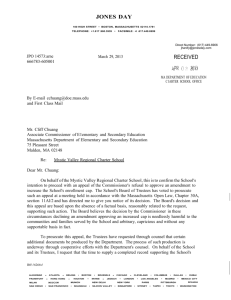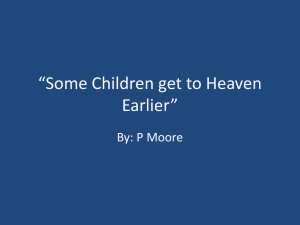HH 815-15

1
HH 815/15
HC 8933/15
CONSTABLE MUBANGA versus
OFFICER-IN-CHARGE, ZRP SUBURBAN
DISTRICT HEADQUARTERS and
OFFICER-IN-CHARGE, ZRP CHUKURUBI DETENTION BARRACKS and
COMMISSIONER-GENERAL, ZIMBABWE REPUBLIC POLICE
HIGH COURT OF ZIMBABWE
HUNGWE J
HARARE, 21 October 2015
Urgent Chamber Application
N Mugiya, for the applicant
T Tabana, for the respondents
HUNGWE J The applicant, a police constable in the Zimbabwe Republic Police, was convicted for contravening section 35 of the Police Act, [ Chapter 11:10 ] (“the Police Act”) by a single officer for a misdemeanour. He was sentenced to seven days imprisonment. He appealed to the Commissioner General in terms of s 34(7) of the Act. His appeal was dismissed. He then filed an “appeal” against the decision of the Commissioner General at this court. In the present application, the applicant seeks an order interdicting the execution of the sentence pending the final determination of that “appeal” by this court.
The respondents have taken a point in limine , that there can be no appeal against the decision of the Commissioner General. As such, the application is ill-conceived and should be dismissed. The respondent argue that since the Police Act does not provide for the right of appeal against the decision of a single officer, then the “appeal” is a nullity and as such the applicant has not established a right, clear or prima facie, entitling him to the order sought.
In order for an applicant in an application for an interdict to succeed, the applicant must establish the traditional requirements for a temporary or final interdict namely;
1.
2.
A clear or prima facie right;
An injury actually committed or reasonably apprehended;
2
HH 815/15
HC 8933/15
3.
4.
The absence of similar protection afforded by any other ordinary remedy; and
A balance of convenience favoring the grant of the interdict.
See Setlogelo v Selogelo 1914 AD 221 at p 227; Boadi v Boadi & Anor 1992 (2) ZLR
378; Tribac (Pvt) Ltd v Tobacco Marketing Board 1996 (2) ZLR 52(5) at p56. Flame Lily
Investment Company (Pvt) Ltd v Zimbabwe Salvage (Pvt) Ltd & Anor 1980 ZLR 378,
Diepsloot Residents’ and Landowners’ Association & Anor v Administrator Transvaal 1994
(3) SA 336.
Mr Mugiya , for the applicant contends that the applicant is entitled to appeal to this court from the decision of the Commissioner General of Police by virtue of the provisions set out in s 70(5) of the Constitution of Zimbabwe. That section provides:
“Any person who has been tried and convicted of an offence has the right, subject to reasonable restrictions that may be prescribed by law, to –
(a) have the case reviewed by a higher court ; or
(b) appeal to a higher court against the conviction and sentence.”
Section 70(5) of the Constitution confers a general right of appeal to a higher court to litigants on appeal or review. It cannot, if understood in that light, confer a basis upon which the applicant has “appealed” to this court. That section does not in any way set out an appeal procedure, and therefore cannot be used as a basis for the argument that the applicant enjoys a right to approach this court through an appeal procedure. The High Court has review jurisdiction over all inferior courts and tribunals in terms of s 26 of the High Court Act,
[ Chapter 7:0 ] Its appellate jurisdiction in civil matters is provided for in s 30 which provides:
“(1) The High Court shall have jurisdiction to hear and determine an appeal in any civil case from the judgment of any court or tribunal from which, in terms of any other enactment an appeal lies to the High Court.
(2) Unless provision to the contrary is made in any enactment, the High Court shall hear and determine and shall exercise powers in respect of an appeal referred to in subsection (1) in accordance with this Act”
In my view, in all other matters the appellate jurisdiction of the High Court is determined by the general provisions contained in s 171 (1) (d) of the Constitution which provide:
“
The High Court has such appellate jurisdiction as may be conferred on it by an Act of
Parliament.”
3
HH 815/15
HC 8933/15
In the present case therefore the fact that the Police Act does not provide for such an appeal is relevant to the determination of the right to appeal. I am aware of the conflicting judgments emanating from this court regarding the existence of the right to appeal from the decision of the Commissioner General where that decision involved a decision by a single officer. Whilst the judgment of my brother Mawadze J commends itself insofar as it dealt with the right to access justice, I respectfully disagree with that reasoning where, as here, the clear provisions of a statute exclude an appeal. One must bear in mind that the law does not strictly leave a litigant without recourse. The review process is available at the conclusion of the determination by the Commissioner General. As Chigumba J observed, there is no provision for an appeal or review to this court from a decision of a single Officer. This court may only review the decision of a Board of Officers, or entertain an appeal against the decision of a Board of Officers. The reasoning behind this discrimination is clear. Single
Officers may only adjudicate on simple offences which do not attract stiff penalties. They preside over a simple, fast and streamlined procedure designed to deal less serious infractions. (per Chigumba J in Jani v Officer-in-Charge, ZRP Mamina & Ors HH-550-15). I am persuaded by the reasoning by Chigumba J as well as that by Mathonsi J in Tamanikwa v
Board President & Anor HH-676-15 which reasoning, to my mind, demonstrate the clear absence of a right of appeal from the decision of a single officer. The fact that the Police Act is silent on whether a member tried by a single officer enjoys a right of appeal to this court does not, on its own amount to the existence of that right. One must read. An appeal lies in the High Court from the decision of the Board of Officers. (s 33 of the Police Act). Where the trial was conducted before a single officer, his decision may be taken on appeal before the
Commissioner General. If the appeal fails, as matters stand in the present case, that is not the end of the matter. It can be taken on review before this court like any decision of any other tribunal. Clearly, the hurdle that applicant must overcome is the establishment of a prima facie right. In the view that I take of this matter, he has not established such a right, prima facie or clear, in the sense that the purported right to an appeal is not provided for nor can it be said to exist. What he is entitled to is a review. That is not his contention. The appellant does not say why a review of the decision by the Commissioner General would not provide appropriate relief. In my view, the matter must be decided on whether he has established a prima facie right of appeal in respect of which he entertains a reasonable apprehension that a failure to grant the interim relief would imperil it. The contention for the appellant is that a proper interpretation of the Constitutional provisions ought to be that he is entitled to appeal
4
HH 815/15
HC 8933/15 against the decision of the Commissioner General dismissing his appeal. As pointed out above, a correct interpretation of the statutory provision must be that because the Act specifically provides for an appeal procedure, then it is only that category of cases to which appeals apply which are subject of the procedure laid out in the Act. In the absence of a similar provision, my view is that the applicant’s relief lies in a review of the decision by the
Commissioner General.
In light of the above, I am satisfied that there is no appeal pending in this court. The purported appeal is a nullity. Since the present application is predicated upon a nullity, it follows that it cannot give any rights to the applicant. There is no basis to interdict the respondents from following through with their that being so this application should therefore fail. The application is therefore dismissed with costs.
Mugiya & Macharaga Law Chambers , applicant’s legal practitioners
Attorney General’s Office
, respondent’s legal practitioners









